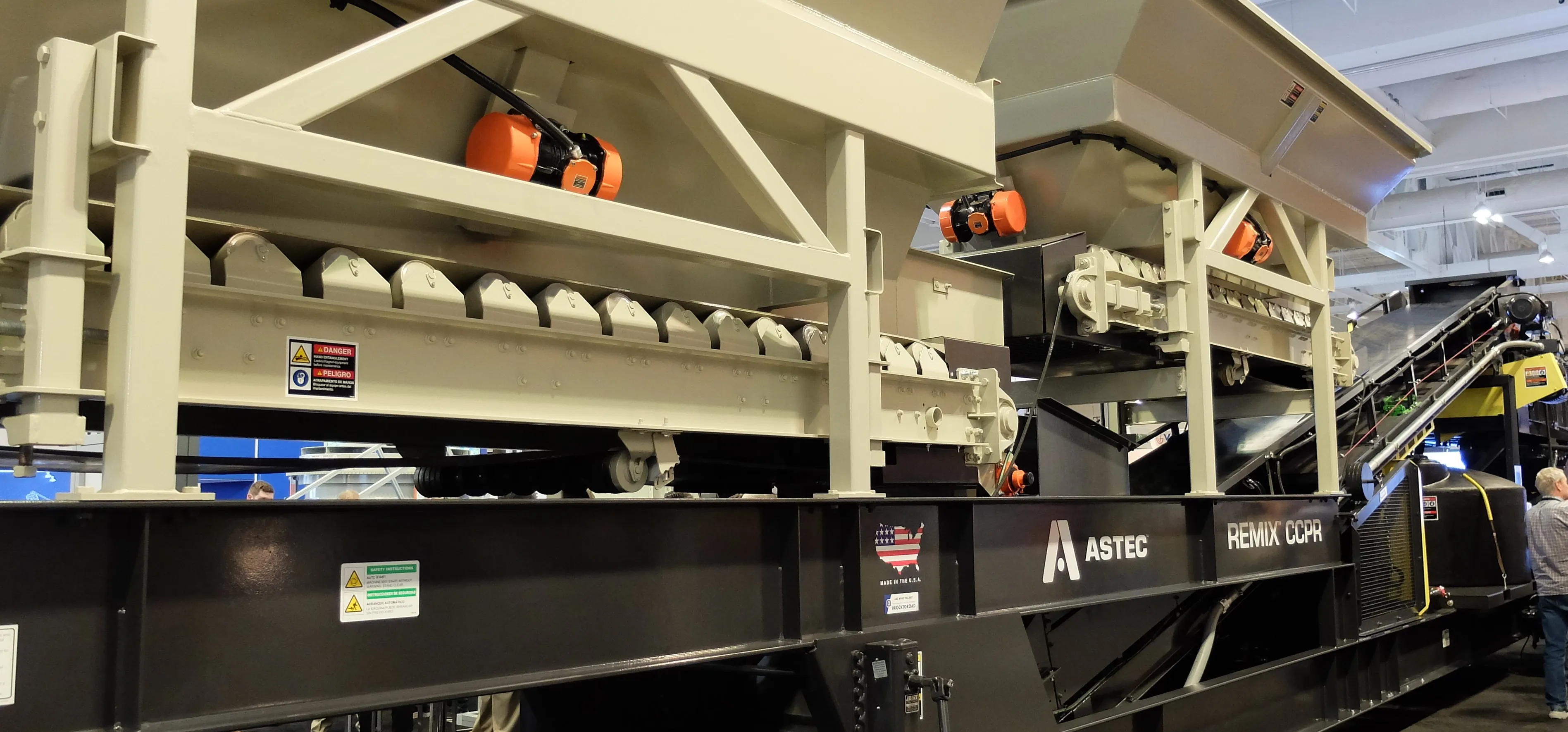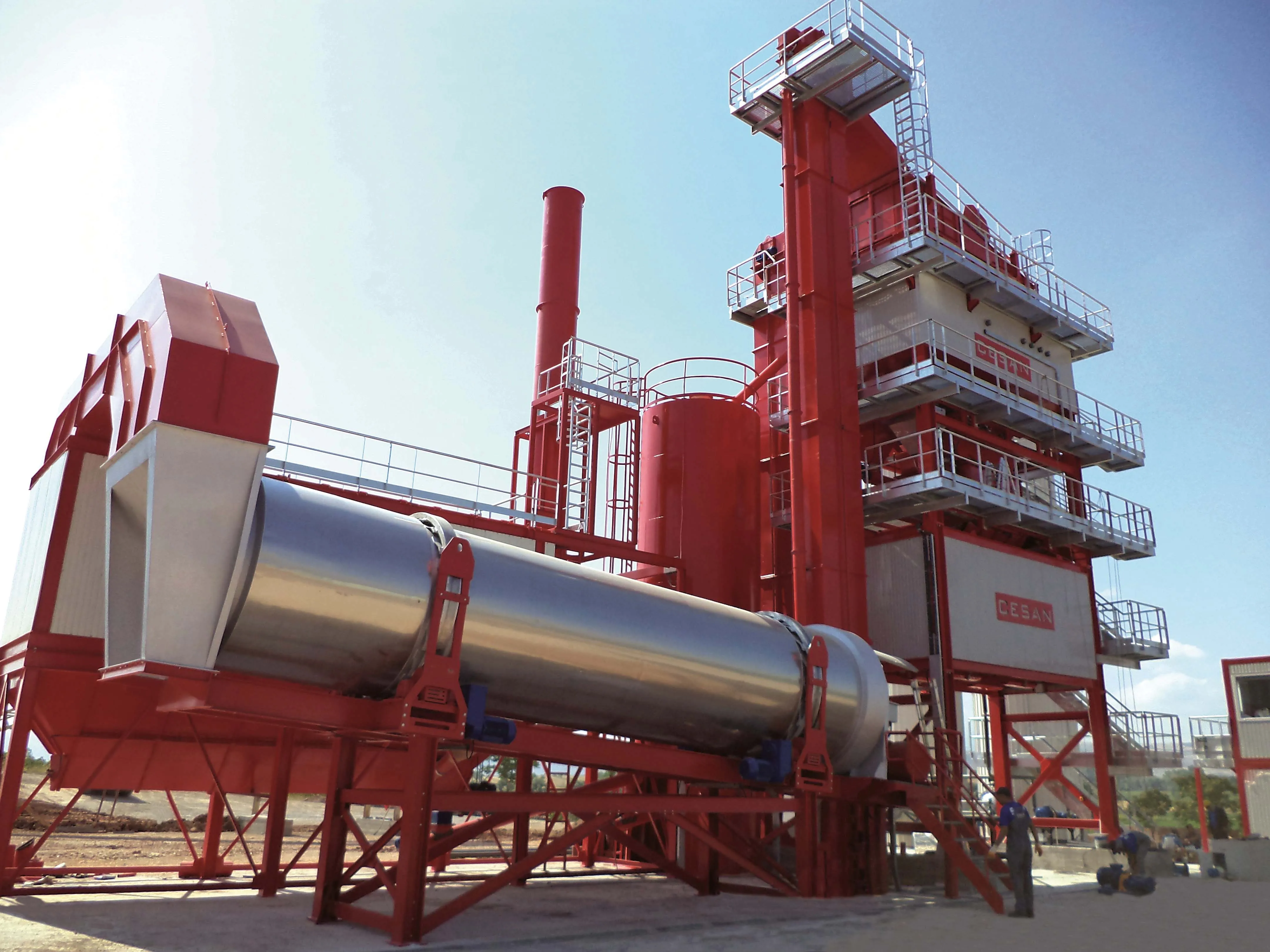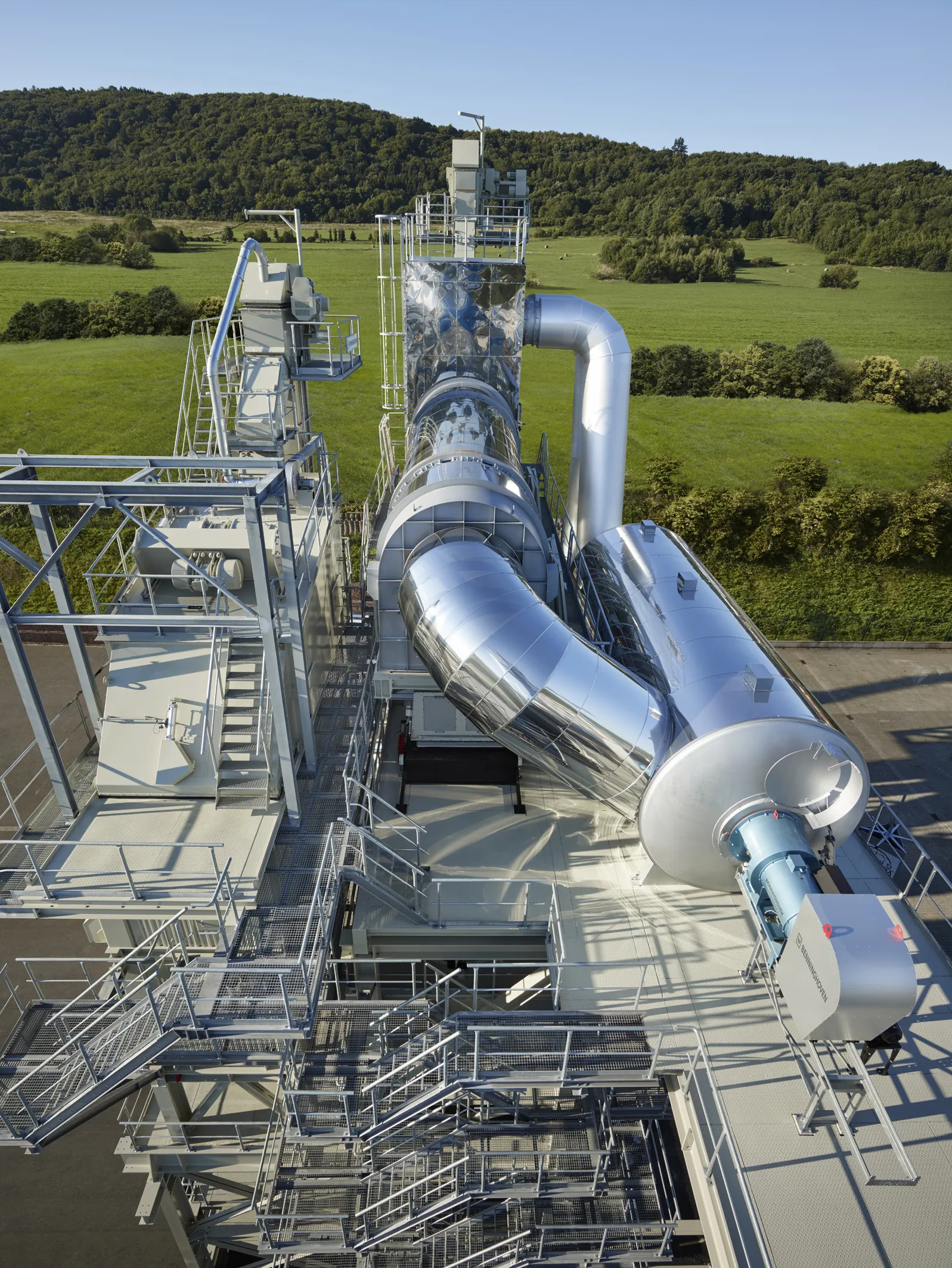
The major manufacturers are making key advances in technology for asphalt plants. New fuels, lower temperature asphalt grades and increased use of recycled materials are all helping ensure greater sustainability for asphalt production.
Reduced emissions represent a key development for Ammann’s latest European asphalt plant technology. The firm’s advanced VRD filtration system from Ammann is able to remove a significant level of emissions, as well as being self-cleaning. The Ammann VOC Reduction Device (VRD) reduces volatile organic compounds (VOCs), odours and other organic carbon emissions. It is the first technology on the market able to self-clean; no filter replacements are needed.
“To have the performance and efficiency of VRD in a self-cleaning system is a significant benefit for businesses,” Marzio Ferrini of Ammann said.
The patented technology means that there is no need for filter replacements and plant uptime is optimised. The modular VRD system is compatible with virtually every type of asphalt-mixing plant, including those from other manufacturers. The system reduces total organic carbon (TOC), which contains VOCs, by as much as 70% under working conditions.
The VRD removes the TOC. In addition, it makes using RAP greener, as a high percentage of VOCs occur while recycling. The system only needs a power supply and on-site space for implementation and requires no special software or upgrades. It can be included in the purchase of a new plant and can be retrofitted to existing plants, while it is also easy to transport and install.
The VRD is a key component of the firm’s Green Plant Initiative, intended to improving the sustainability of asphalt production.
Meanwhile, Ammann is also offering a continuous type asphalt plant for customers in the North American market. Designed and developed in the US but benefiting from some of the firm’s European technology, the new plant will be manufactured in a new facility Ammann is setting up in the US.
The new Ammann Alpina plant will be able to produce from 270-540tonnes/hour of asphalt and features a drum mixer design aimed at North American market needs. Ferrini commented, “We are going to open our new factory and it will be built there. It’s a product specifically for that market.”
He said that the plant will be able to use sufficient percentages of recycled asphalt pavement (RAP) in the feed to meet US market needs also.
Astec Industries is releasing its sophisticated Astec ReMix Cold Central Plant Recycling (CCPR) System, which is able to make efficient use of reclaimed asphalt pavement (RAP) stockpiles.
The CCPR system is said to be powerful and versatile and can produce up to 270tonnes/hour. Featuring a modular design, the system can be configured to customer needs, reducing upfront costs and ensuring adaptability. The CCPR system is said to be a reliable performer, featuring proven technology, including the pugmill, foaming system, and controls. Ease of access is said to make the ReMix CCPR system easy to maintain, boosting uptime.
The Cold Recycling Technology is said to help minimise environmental impact by reusing RAP and mixing this at ambient temperatures, reducing the need for both virgin aggregate and energy for heating the mix. This conserves natural resources and lowers carbon emissions.
The Astec ReMix system offers a range of modular configurations, providing versatility to asphalt mixing operations. From highly portable setups suitable for changing locations to maximum production configurations capable of handling large-scale road construction, Astec ReMix CCPR offers producers the options to meet diverse requirements.
The firm says that its CCPR system is engineered for efficiency and cost-effectiveness. By maximising the use of recycled materials, it reduces disposal costs associated with RAP and also minimises the need for new aggregate production.
Astec claims that its CCPR system features an intuitive user interface, making it easy for operators to monitor and control asphalt recycling, boosting productivity and reducing the learning curve for operators.
New asphalt plant solutions from Benninghoven are also said to lower emissions, with the firm offering a variety of innovative solutions for increasing sustainability in asphalt production. Considering the entire road construction process from material acquisition and asphalt production to building the roads, companies can save up to 54 % CO2 by using these technologies according to the firm.
Benninghoven has considerable experience of using RAP in asphalt mixes and says that this offers several benefits. Reusing RAP produced by milling asphalt during road resurfacing is cheaper than virgin mineral from a quarry and already contains bitumen, which saves on the most expensive ingredient in asphalt production.
The firm offers different cold and hot recycling feed systems for this, including the Benninghoven hot-gas generator. This allows up to 100% recycling material to be added, with low emissions. The Benninghoven REVOC system is a patented innovation and is a retrofit solution that supplements existing asphalt mixing plants equipped with one or more recycling systems, reducing the total carbon concentrations in the exhaust gas.
Fuel and emissions can be saved if authorities and owners use reduced-temperature asphalt with a final temperature of around 120°C. The savings for energy and CO2 can be substantial, 18,000kWh and 6,000kg CO2 are saved during the production of 2,000tonnes of asphalt using this technology.
One important technology for this is a foam bitumen module, which Benninghoven offers as a retrofit solution. Mixing hot bitumen with water multiplies the volume many times and the released surface energy ensures that the binder moistens the mineral during mixing, even at low temperatures, temporarily generating installation properties comparable to those of hot asphalt.
From Marini comes the efficient EvoDryer system, which is said to offer high efficiency and high quality for asphalt batching applications. The drum is now longer and the burner has been redesigned to ensure performance is maximised. A key feature of the reconfigured design is with the reduction of blue smoke from the pugmill and discharge areas. This is collected and filtered to minimise emissions.
The air out of the drum is also filtered to reduce emissions, while the hot air is recirculated into the drum, boosting efficiency and reducing fuel consumption. Recirculating the air also reduces the emissions from the plant, a major boost for environmental performance.
Also from the Fayat Group, SAE is offering a novel cold mix system that is said to offer extra versatility for asphalt plants. The system is said to be adaptable for any plant installation, as long as there is sufficient room. A spokesperson for the firm said, “It can be implemented on any asphalt plant from any manufacturer and that has any software.”
The unit can allow a conventional asphalt plant to produce a quality cold mix, but at a much lower cost than a dedicated cold mix plant. The spokesperson said, “It’s a very compact design and fits inside a standard shipping container.”
The plant is said to be highly versatile and can use virgin materials or high percentages of RAP in the feed. Water injection, different binders and a range of additives can be used to suit the materials and application. By positioning the pugmill next to the plant, this makes the system easier to handle according to SAE and output can be up to 200tonnes/hour. SAE also says that this plant can help producers meet targets on decarbonising their operations. The spokesperson commented, “By definition it is decarbonised because there’s no heating.”
Turkish alternative
Turkish firm E-MAK is now supplying its asphalt plants to customers in Europe. The first plant is already commissioned in Bilbao in Spain with a second being delivered shortly to a customer in the UK. The machine going to the UK is being supplied to a Derby-based firm that has previously concentrated on the concrete precasting and readymix market but is now widening its operations to include supplying asphalt. The firm is buying one of the E-MAK Express batching plants, which will offer a rated capacity of 160tonnes/hour.
Meanwhile, E-MAK also has high hopes for its proven Challenger aggregates storage system for customers in Europe. This machine can be used to receive large quantities of large aggregates, then crushes and screens the materials before storing them inside. Using the Challenger can make significant energy savings for asphalt production as the aggregates are stored in a dry place, reducing the amount of heating and fuel required by the asphalt plant.
Ac Emre Gencer at E-MAK commented, “According to our tests you can save a minimum of 38% of energy in asphalt production and that can rise to 62% in winter.”
Given the need to reduce the carbon footprint of materials production for construction, E-MAK believes it has a credible solution that can deliver major benefits to contractors.









